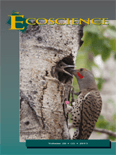
ECOSCIENCE
Scope & Guideline
Connecting researchers to shape the future of our environment.
Introduction
Aims and Scopes
- Biodiversity and Conservation:
Research on species diversity, conservation strategies, and the impact of human activities on ecosystems. This includes assessments of endangered species and the effectiveness of conservation policies. - Ecosystem Dynamics and Functioning:
Studies that explore the interactions within ecosystems, including nutrient cycling, energy flow, and the effects of disturbances such as fire, climate change, and urbanization. - Human-Environment Interactions:
Investigations into how human activities influence ecological processes, including land use changes, urbanization effects, and agricultural practices on wildlife and plant communities. - Restoration Ecology:
Research focused on the rehabilitation of degraded ecosystems, including techniques for restoring native plant communities and evaluating the success of restoration efforts. - Climate Change Impact:
Studies assessing the impacts of climate change on various ecological parameters, such as species distribution, phenology, and ecosystem resilience. - Ecological Modeling and Data Analysis:
Application of modeling techniques and statistical analyses to understand ecological patterns and predict future ecological scenarios.
Trending and Emerging
- Urban Ecology:
There is an increasing focus on the ecological dynamics within urban environments, including species adaptations to urbanization, urban biodiversity, and the effects of urban landscapes on wildlife. - Climate Resilience and Adaptation:
Research exploring how ecosystems and species adapt to changing climatic conditions is gaining traction, emphasizing the importance of resilience in conservation strategies. - Ecological Restoration Techniques:
Innovative methods for ecological restoration, including the use of native species and natural processes, are becoming more prominent as the need for effective restoration practices grows. - Ecosystem Services and Human Well-being:
A trend towards investigating the relationships between ecosystems and human well-being highlights the importance of ecosystem services in policy-making and sustainable development. - Biodiversity in Anthropogenic Landscapes:
Emerging studies are focusing on biodiversity within modified landscapes, examining how human-altered environments can still support diverse ecological communities.
Declining or Waning
- Historical Ecology:
While historical approaches to studying ecosystems have been important, there has been a noticeable decline in papers focusing on long-term historical ecology, possibly due to a shift towards immediate ecological impacts and restoration strategies. - Traditional Taxonomy and Species Identification:
Research centered solely on taxonomic classification has decreased as the field moves towards integrative approaches that combine genetic, ecological, and geographical data for a more comprehensive understanding of biodiversity. - Static Environmental Assessments:
There is a waning interest in static assessments of environmental conditions, as researchers increasingly focus on dynamic interactions and changes over time, particularly in the context of climate change. - Invasive Species Management:
While still relevant, the focus on invasive species as isolated studies has diminished, with a broader interest in understanding their ecological roles and interactions within ecosystems. - Single-Species Studies:
Research focused on individual species without consideration of ecological context is declining, as there is a growing emphasis on community-level interactions and ecosystem functions.
Similar Journals

OIKOS
Championing high-impact research in the heart of ecology.OIKOS is a leading journal dedicated to the field of Ecology, Evolution, Behavior, and Systematics, published by WILEY in the United Kingdom. Since its inception in 1973, OIKOS has established itself as a vital platform for researchers seeking to advance their understanding of ecological interactions and evolutionary processes, with its impact reflected in its prestigious Q1 classification in the 2023 Scopus rankings. The journal's dedication to high-quality research is exemplified by its robust ranking of #106 out of 721 in the relevant categories, situating it within the top 15% of journals globally. With a commitment to disseminating influential findings, OIKOS encourages the open exchange of ideas among a diverse range of scholars, making it an essential resource for academics, professionals, and students alike. Whether you are interested in innovative ecological theories or applied research with real-world implications, OIKOS provides a rich repository of knowledge to inform and inspire your work.

ACTA OECOLOGICA-INTERNATIONAL JOURNAL OF ECOLOGY
Navigating the Complexities of Nature and ConservationACTA OECOLOGICA-INTERNATIONAL JOURNAL OF ECOLOGY, published by Elsevier, stands as a prominent platform for disseminating innovative research in the diverse field of ecology. Operating since 1983 and continuing to make significant contributions into 2024, this journal features critical studies that advance our understanding of ecological systems, behaviors, and conservation efforts. With an impressive Q2 ranking in both the ecology and nature conservation categories, it exemplifies high-quality scholarship, reflected in its Scopus rankings—#74 in Environmental Science and #254 in Agricultural and Biological Sciences. Researchers, professionals, and students in the field are invited to explore the latest findings and methodologies that address pivotal ecological issues. As a journal committed to fostering academic collaboration, ACTA OECOLOGICA is essential for anyone dedicated to enhancing their comprehension of ecological dynamics and advancing sustainability practices globally.

FOLIA GEOBOTANICA
Pioneering research at the intersection of plants and paleontology.FOLIA GEOBOTANICA, published by Springer, is a distinguished journal dedicated to advancing the fields of Paleontology and Plant Science through the dissemination of high-quality research. With an ISSN of 1211-9520 and an E-ISSN of 1874-9348, this journal has been pivotal in providing a platform for innovative studies from 1994 to 2024. Notably, FOLIA GEOBOTANICA holds a Q3 ranking in Paleontology and a Q2 ranking in Plant Science as of 2023, affirming its relevance and contribution to the scholarly community. The journal is located in the Netherlands at VAN GODEWIJCKSTRAAT 30, 3311 GZ DORDRECHT, and is not an Open Access publication, ensuring comprehensive review processes and scholarly integrity. With Scopus rankings that place it in the 50th percentile for Plant Science and 46th for Paleontology, FOLIA GEOBOTANICA continues to attract researchers, professionals, and students who are keen to explore the intricacies of plant ecology and fossil records, thereby fostering a deeper understanding of ecological and evolutionary patterns.

ECOLOGY LETTERS
Elevating ecological discourse with every publication.ECOLOGY LETTERS, published by Wiley, is a premier journal dedicated to advancing the field of ecology and related disciplines. Renowned for its rigorous peer-review process and impactful research contributions, the journal boasts an impressive Scopus Rank of #13 out of 721 in the category of Agricultural and Biological Sciences, positioning it in the 98th percentile globally. With a Q1 rating in the 2023 quartile rankings for Ecology, Evolution, Behavior and Systematics, it serves as an essential platform for ecologists and evolutionary biologists to disseminate cutting-edge research findings from 1998 to 2024. Although not an open-access journal, ECOLOGY LETTERS actively contributes to the global ecology discourse, making it a critical resource for researchers, professionals, and students dedicated to understanding complex ecological interactions and evolutionary processes.

BIODIVERSITY AND CONSERVATION
Empowering researchers to tackle biodiversity challenges.Biodiversity and Conservation is a leading peer-reviewed journal published by Springer, dedicated to advancing the understanding of biodiversity and the critical aspects of conservation biology. With an impact factor that consistently places it in the Q1 category across multiple fields including Ecology, Evolution, and Nature and Landscape Conservation, this journal serves as a vital resource for researchers, professionals, and students who aim to address the pressing challenges of biodiversity loss and ecosystem management. Established in 1992, the journal has successfully created a platform for high-quality research and innovative approaches, facilitating the dissemination of knowledge that informs conservation practices globally. With a strong ranking in Scopus, it highlights the importance of rigorous scientific inquiry in the preservation of our natural world. Subscribers can access a wealth of articles that encompass a broad range of topics pertinent to both theoretical and practical aspects of biodiversity, encouraging an interdisciplinary dialogue among the diverse fields of environmental science and conservation.
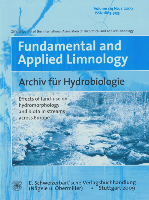
Fundamental and Applied Limnology
Connecting Theory and Practice: Your Resource for Freshwater ResearchFundamental and Applied Limnology is an esteemed academic journal dedicated to the exploration of freshwater ecosystems, bridging the gap between fundamental research and practical applications. Published by E Schweizerbart'sche Verlagsbuchhandlung in Germany, this journal has been a vital resource in the fields of aquatic science and ecology since its inception in 2007. With its ISSN 1863-9135 and E-ISSN 1863-9135, it provides a platform for researchers to disseminate significant findings related to limnology, contributing to a rich understanding of freshwater biodiversity, water quality, and ecological interactions. Although currently rated in the Q3 quartile for aquatic sciences and ecology as per the 2023 rankings, it remains a valuable outlet for interdisciplinary research and practical insights, facilitating critical advancements in environmental management. Open access options enhance its visibility and accessibility, making it indispensable for researchers, professionals, and students alike who are committed to advancing the scholarship in freshwater studies. Engaging with this journal not only opens doors to the latest research findings but also fosters collaboration and innovation in the ecological community.
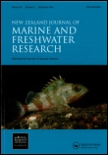
NEW ZEALAND JOURNAL OF MARINE AND FRESHWATER RESEARCH
Connecting Researchers for a Sustainable Aquatic FutureNEW ZEALAND JOURNAL OF MARINE AND FRESHWATER RESEARCH, published by Taylor & Francis Ltd, stands as a distinguished platform for the dissemination of innovative research in the realms of aquatic science and ecology. With an ISSN of 0028-8330 and E-ISSN 1175-8805, this journal has been curating significant scientific contributions since its inception in 1967, continuing through to 2024. Recognized in the Q2 category across multiple relevant fields—including Aquatic Science, Ecology, and Water Science—this journal ranks notably in Scopus, with a 74th percentile for Ecology, Evolution, Behavior and Systematics, highlighting its impact and relevance within the scientific community. Though not an open-access publication, its rigorous peer-reviewed articles offer insights that resonate with researchers, professionals, and students who are passionate about advancing our understanding of freshwater and marine ecosystems. By fostering a collaborative space for ecological and environmental inquiries, the NEW ZEALAND JOURNAL OF MARINE AND FRESHWATER RESEARCH is essential for those aiming to contribute to the vital conversations around biodiversity, conservation, and sustainable management of aquatic resources.
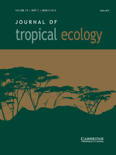
JOURNAL OF TROPICAL ECOLOGY
Illuminating Biodiversity in Tropical EnvironmentsThe JOURNAL OF TROPICAL ECOLOGY, published by Cambridge University Press, serves as a pivotal platform for advancing knowledge in the field of ecology, particularly within tropical environments. With an ISSN of 0266-4674 and an E-ISSN of 1469-7831, this esteemed journal has been a key resource since its inception in 1985, maintaining a focus on empirical research that addresses the complexities of tropical ecosystems. It holds a respectable Q3 ranking in the Ecology, Evolution, Behavior and Systematics category as of 2023, indicating its significant contribution to the field, although it remains within the competitive mid-range. The journal publishes original research, reviews, and methodological articles that illuminate the rich biodiversity and unique ecological processes of tropical regions, fostering a deeper understanding of conservation challenges. Accessible from the United Kingdom, this publication appeals to a diverse audience of researchers, professionals, and students keen on exploring ecological dynamics in tropical settings, and plays a crucial role in promoting scientific discourse and collaborative efforts aimed at preserving our planet's vital ecosystems.
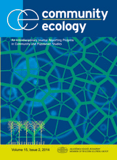
COMMUNITY ECOLOGY
Fostering Insights into Species Interactions and Community StructuresCOMMUNITY ECOLOGY is a distinguished journal published by Springer Heidelberg that focuses on the intricate dynamics of ecological interactions within communities. Established in 2000 and continuing robustly through to 2024, this journal aims to disseminate significant research findings that contribute to the understanding of ecological processes, species interactions, and community structures. With an ISSN of 1585-8553 and an E-ISSN of 1588-2756, the journal holds a commendable position in the academic sphere, reflected in its Q2 quartile rankings in the categories of Ecology and Ecology, Evolution, Behavior and Systematics. It boasts an impressive Scopus ranking within the 57th percentile for both Agricultural and Biological Sciences and Environmental Science fields, attesting to its relevance and influence. Though it does not currently operate under an open access model, COMMUNITY ECOLOGY remains a vital resource for researchers, professionals, and students eager to advance their knowledge in community ecology, highlighting the importance of collaborative research in addressing ecological challenges globally.

BIOTA NEOTROPICA
Exploring the Rich Tapestry of Neotropical LifeBIOTA NEOTROPICA is a prominent open access journal dedicated to advancing knowledge in the interdisciplinary field of ecology, evolution, behavior, and systematics. Published by REVISTA BIOTA NEOTROPICA since 2001, this Brazilian journal aims to provide a platform for high-quality research that fosters a deeper understanding of Neotropical biodiversity and its conservation. With an ISSN of 1676-0603 and an E-ISSN of 1676-0611, the journal has established its reputation within academic circles, ranking in the Q3 quartile for Ecology and achieving a respectable percentile of 57 in Scopus’s metrics. Operating from its headquarters in Campinas, SP, Brazil, BIOTA NEOTROPICA not only focuses on research dissemination but also encourages collaboration and exchange of ideas among scientists, students, and professionals in the field. The journal is particularly valuable for those looking to contribute to the understanding of ecological systems and promotes accessibility with its open access model.